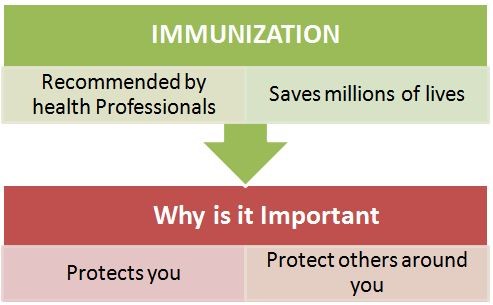World Immunisation Week: An Endeavour to ‘Close the immunisation gaps’

Immunisation is one of the world’s most successful and cost-effective healthcare investments that has been instrumental in averting close to 2 – 3 million deaths each year. However, an additional 1.5 million deaths could be avoided if global vaccination coverage improves. Following this ambition, on the occasion of World Immunisation Week, WHO, reaffirms its commitment to ‘Close the immunisation gap’ so that no one misses out on vital immunisation. Last week of April primarily dedicated for World Immunisation week in the medical calendar, aims to encourage vaccination among the community as a whole from new born children to adults to protect them against major epidemic diseases.
What is immunisation?
Immunisation is a process where the person is provided essential vaccines to make him/her resistant to certain deadly and infectious diseases for which there are either no or limited medical treatments. Such powerful vaccines help stimulate the body’s immune system thereby mitigating the vulnerability to life-threatening diseases. For instance, if there is a sudden outbreak of an epidemic, with immunisation, the chances of people suffering are either zero or very minimal.
Importance of Immunisation
A vast majority of health professionals and experts in the world recommend immunisation. Immunisation helps save millions of lives. It is important particularly for two reasons – to protect you and those around you. Vaccination is the only way to prevent infectious diseases. In certain cases, some people are susceptible to having an impaired immune system, a condition that critically weakens the body’s immunity and doesn’t respond to any vaccination. And for such people, protection is only when others get vaccinated so that the diseases are less prevalent.
Although, some diseases, such as polio, rarely occur, all the vital childhood immunizations and booster vaccines are still necessary. Although certain diseases have been eradicated from our country, it still exists in other parts of the world. In such a scenario, there is a major likelihood for strange diseases to permeate the country infecting people at large through travellers who are unknowingly affected. Hence, with immunisation, the body’s immune system can fight a disease better and faster.

While immunisation is important, improved sanitation, hygiene, and other living conditions also contribute to reducing exposure to critical and fatal diseases. A successful vaccination programme and a healthy environment depend on the co-operation of every individual. Thus, immunisation is a proven healthcare tool and is each one’s prerogative.
Sources:
http://www.who.int/campaigns/immunization-week/2016/en/
http://www.who.int/campaigns/immunization-week/2016/event/en/
http://www.who.int/topics/immunization/en/
http://www.webmd.com/children/vaccines/tc/importance-of-immunizations-topic-overview

